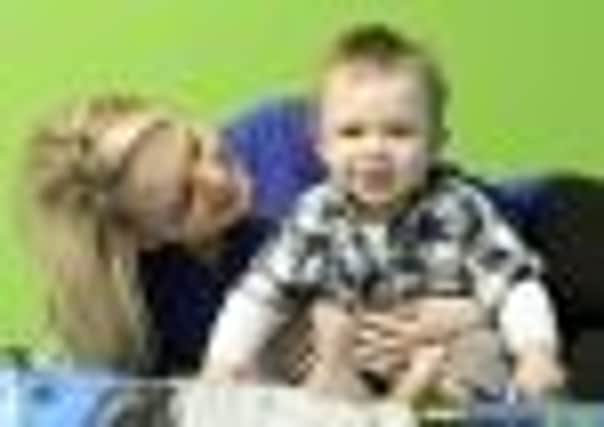Harry’s epilepsy’s so rare, even docs were stumped


Harry, who has just turned one, has been diagnosed with an extremely rare epileptic condition that only presents itself in one baby a year in the UK.
Every week Harry has at least two major seizures, ranging from a fit lasting a few minutes to a full-on two-hour convulsion resulting in a trip to intensive care.
Advertisement
Hide AdAdvertisement
Hide AdIn an effort to control his Dravet syndrome, he is on a cocktail of medication that has only ever been tried on three other people.
While the youngster appears completely normal, his parents know that his future will be one of uncertainty.
Mum Lynne Massey, 28, who lives in Mayfield, Dalkeith, with partner Stuart Reid, 30, said: “In the first year of life he is totally normal. It’s between the ages of one and four that it begins to kick in.
“To look at Harry you wouldn’t think there was anything wrong at all, but there is a chance he will have learning disabilities, difficulty with mobility and will generally be slower to pick things up.
“He could also have a limited life expectancy.
“We’re terrified to have anyone babysitting because there is so much to know about how to deal with it – with every seizure he has it’s always in the back of my mind that it could be the one that loses his sight, or his speech.”
Everything was going well with the newborn until, at five months, he had a seizure.
Their GP reassured them this was probably just a mild fit relating to teething, and their fears were further allayed when it emerged that Ms Massey herself suffered such fits as a baby.
But the episodes continued, became more frequent and eventually a diagnosis was made.
Advertisement
Hide AdAdvertisement
Hide AdHarry also suffers around 50 “absent seizures” a day, which are effectively fits below the surface where the brain is affected but the body is not.
“The condition is so rare that not even the doctors knew what it was,” Ms Massey added.
Both she and Mr Reid, a research technician with Queen Margaret University, were tested for the gene mutation, and it was found to be in Ms Massey.
“Even then, there was only a five per cent chance I would pass it on,” she said. “It’s really unlucky. If you had a five per cent chance of winning £200, you’d never win it.
“Just now it’s all about watching Harry’s day-to-day life and hoping for the best for him. The medication is pretty much trial and error just now until we find the best solution.
“He will have this for life, there is no cure. But we are fortunate to have great support from our family.”
Ann Maxwell, founder of the Muir Maxwell Trust – a charity that helps families dealing with various forms of childhood epilepsy – created the organisation with husband Johnny after their son was diagnosed with the same illness as Harry.
She said: “It’s hard to say statistically just how rare it is.
Advertisement
Hide AdAdvertisement
Hide Ad“It is very rare, but more importantly for families the effects can be the most profound of all childhood epilepsies.
“When my son Muir was diagnosed 10 years ago, we were told there were only 80 children in the world with it.
“Since then, we’ve been able to improve diagnosis and find others with it.
“That’s not to say it is on the rise, and the earlier the diagnosis the quicker interventions can be made.”